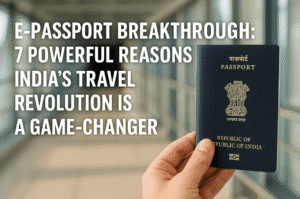E-Passport Breakthrough: 7 Powerful Reasons India’s Travel Revolution Is a Game-Changer
India’s Ministry of External Affairs launched e-passports in April 2024 under the Passport Seva Programme 2.0, integrating RFID chips embedded with biometric and personal data for enhanced security. These next-gen passports, identifiable by a gold chip symbol, use encryption to prevent tampering and forgery, aligning with global standards for faster immigration checks. Initially available in 13 cities—including Delhi, Chennai, Hyderabad, and Jaipur—the program aims for nationwide rollout by mid-2025.
Existing passports remain valid until expiration, with upgrades optional during renewals. The e-passport’s encrypted chip ensures data privacy while streamlining border processes, reducing identity theft risks, and improving travel efficiency. Designed to last a decade, the technology positions India alongside global leaders in secure digital documentation. This initiative reflects India’s commitment to tech-driven governance, offering citizens a future-ready tool for seamless international mobility.

E-Passport Breakthrough: 7 Powerful Reasons India’s Travel Revolution Is a Game-Changer
India has embarked on a transformative journey to modernize its passport system with the introduction of e-passports, blending cutting-edge technology with enhanced security. Launched as part of the Passport Seva Programme (PSP) Version 2.0 in April 2024, this initiative aims to streamline international travel while safeguarding citizens’ data from fraud. Here’s what you need to know about this groundbreaking upgrade.
What Makes E-Passports Different?
E-passports, or electronic passports, embed a microchip within the cover—marked by a small gold symbol—that stores the holder’s personal details, photograph, and biometric data (like fingerprints). Utilizing Radio Frequency Identification (RFID) and Public Key Infrastructure (PKI) encryption, the chip ensures data cannot be tampered with or duplicated. Immigration authorities globally can quickly authenticate the passport by scanning the chip, reducing manual checks and wait times.
Key Advantages for Travelers
- Fortified Security: The encrypted chip deters forgery and identity theft, a significant upgrade from traditional passports.
- Faster Border Crossings: Automated verification speeds up immigration processes, a boon for frequent travelers.
- Global Compliance: Aligns with International Civil Aviation Organization (ICAO) standards, easing acceptance worldwide.
- Durability: The chip is designed to last the passport’s 10-year validity, resistant to everyday wear and tear.
Where Can You Apply?
Initially available in 13 cities, including Delhi, Chennai, Hyderabad, and Jaipur, the government plans to expand e-passport services nationwide by mid-2025. Early adopters in cities like Goa and Amritsar have already begun accessing the pilot program.
How to Get Your E-Passport
The application process mirrors traditional passports but with added tech integration:
- Online Portal: Start with the Passport Seva website (www.passportindia.gov.in) to fill the form and book appointments.
- Documentation: Submit standard proofs (Aadhaar, PAN, birth certificate) along with biometric data at your appointment.
- Fee Payment: Current pricing aligns with regular passports, though expedited services may cost extra.
- Delivery: Track your e-passport’s status online; processing times remain similar (1–3 weeks).
Addressing Common Concerns
- “Is My Current Passport Still Valid?”: Yes! Existing passports remain valid until expiration. Upgrade only if renewing or applying anew.
- Privacy Risks?: PKI encryption ensures data is accessible only to authorized scanners, mitigating unauthorized access.
- Global Readiness: Over 150 countries accept e-passports, including the U.S., UK, and EU nations.
The Road Ahead
While the rollout marks a milestone, challenges like ensuring nationwide infrastructure readiness and public awareness remain. Privacy advocates emphasize the need for robust safeguards against RFID skimming, though India’s encrypted design mirrors global best practices.
For now, the e-passport represents India’s commitment to secure, tech-driven governance. As the program expands, it promises to redefine seamless travel for millions, positioning India alongside nations like Germany and Australia at the forefront of passport innovation.
Final Takeaway
E-passports are not just a convenience—they’re a strategic upgrade in an era where digital security is paramount. Whether you’re a globetrotter or a first-time applicant, this innovation ensures your identity stays protected across borders. Keep an eye on updates as services expand to your city, and consider opting for the e-passport during your next renewal to future-proof your travels.
You must be logged in to post a comment.